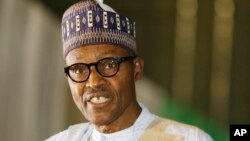Nigerians have voted a former military dictator as their next president.
Muhammadu Buhari, a retired general and former military leader, said he is a born-again democrat, but those who remember his harsh military regime wonder if he is really a changed man.
Buhari is certainly not a quitter. The 72-year-old former military leader plotted more than one army takeover before he came to power in a military coup.
He ran unsuccessfully for president three times before beating Goodluck Jonathan in the country’s March elections - becoming the first Nigerian presidential candidate to defeat the incumbent at the ballot box. His victory has been hailed as a political turning point and a major step forward for democracy in Nigeria.
Many questions
Others, like artist Femi Kuti, might question why the world is celebrating a former military dictator.
“Do I believe he is a changed man? I don’t think so. And if he’s a changed man, it’s his surrounding, the people in his political party, are they changed? Can he convince them to change? Can he convince them to not be corrupt? I don’t believe so, but then I don’t want to be pessimistic,” Kuti said.
As a young boy Kuti, the son of Afrobeat legend Fela Kuti, witnessed his father being sentenced by a military tribunal to five years’ imprisonment on what he insists were trumped-up charges.
International human rights group Amnesty International declared the charismatic singer a political detainee and campaigned for his release. Thirty years later, Femi Kuti has not forgotten what Buhari did to his family.
“It was horrific. It was terroristic. It was depressing. Let’s take for instance the story of my father, who was arrested for taking £1,600 ($2,181). And he declared it and he was charged and jailed … I witnessed the beatings, and the trauma and all what my father went through,” Femi Kuti said.
In interviews, Buhari has taken full responsibility for his actions during his time in power. He has apologized to political opponents. In a speech, he called himself a “reformed democrat.”
Political analyst Cheta Nwanze said he does see a difference between Buhari now and then.
“Some of the language that’s been coming from him is not as firm as it used to be back in the day. In the previous three elections, there was this air of 'it’s my way or the highway.' It’s like the last four years have actually taught him that democracy you don’t achieve by giving orders, but by compromise,” Nwanze said.
Buhari ruled Nigeria for 20 months, from 1983 to 1985.
'War on indiscipline'
During his time in power, he declared what he called a “war on indiscipline.” Political opponents and critics of his regime were jailed. He introduced schemes to end corruption, struck out against drug trafficking and forced unruly citizens to form neat lines at bus stops. His laws restricting press freedom were the worst in the country’s history.
Today, journalist Alkasim Abdulkadir said he sees a reformed leader that is ready to cooperate across party lines, ethnic groups and country borders.
“Only a democrat will talk about international cooperation with African states, with Western powers. Will talk about how to collectively tackle the insurgency. How to collectively tackle corruption because these are yields that can only be tackled in a cooperative manner,” Abdulkadir said.
In the recent election, voters showed they meant business - leaders can no longer perform badly and expect to stay in power.
“If as a military leader he never listened to lobby, as a democratic leader he always has to listen to lobby, because it’s the lobby that gave him the vote,” Abdulkadir said.
During his previous campaigns, Buhari refused to accept favors from donors that he considered untrustworthy. This time he has been criss-crossing Nigeria in private jets.
Change is not a one-man affair, Abdulkadir pointed out. But Buhari’s principals and morals have already had an effect.
“Every time I drive at night, I have a policeman asking me for dash (a bribe), to give them something. I don’t want to give him advertly the credit, but no policeman has asked me for dash since he became president-elect,” Abdulkadir said.
Held accountable
Femi Kuti thinks Nigerians will hold President Buhari accountable.
“He better do what he has said. If he doesn’t, he can be rest assured there will be many people that are ready to be on his case. Me, for example,” Femi Kuti said.
Buhari has promised to deal with corruption, widening inequality and a deteriorating security situation in the country’s northeast, where the Islamist militant group Boko Haram leads an increasingly violent insurgency.
To Umar Dala, a retired police officer from Borno state, one of the three northeastern states that make up Boko Haram's base, the militants' rise is a symbol of the former government's failure. He is convinced Buhari is the best leader for Nigeria.
"He has the experience. He knows the problem of the country more than any other person. The military, he knows the problem. Someone who has once been the head of the state knows where the feet pinches him in the shoe,” Dala said.
The recent election sends a strong message to Buhari as well: If he fails, he could be voted out.
